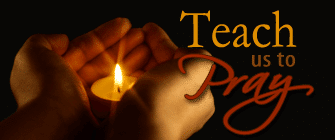So, I’ve Got Some Questions About “Liturgical Prayer”

Johnny P. has been hanging around The UnCommon Journey for a few months. He enjoys reading the posts that challenge the status quo of his nondenominational upbringing. Right now he’s burned out on church. So, the UnCommon Journey posts help keep him afloat spiritually. But, when he read the post about liturgical prayers a couple days ago it was almost too much. He just had to respond.
[featured-image single_newwindow=”false”]Johnny P.: Dr. K, why are you emphasizing prayer liturgy, rhythms of prayer, rituals, and a rule of prayer?
Dr. K: I believe this is what Jesus taught his disciples in the “Lord’s Prayer.” When asked “Teach us to pray” Jesus responded by giving them words to say and ways to say them. Learning something always involves repeated practice. Ask a pianist, baseball player, writer, or electrician how he or she learned their craft. Practice. Practice. Practice. Prayer is no exception. You learn to pray by practicing praying. Set prayers make this possible.
Johnny P: Doesn’t Jesus teach against such things telling us to “not heap up empty phrases as the Gentiles do because they think they will be heard for their many words?” We are not supposed to be like them, right?
Dr. K: Look at Jesus’ words closely. He is giving at least two prohibitions:
- to not keep repeating empty phrases, that is, prayers that lack meaning, substance, and purpose.
- don’t be like the Gentiles who believe they’ll get what they want from God using piles and piles of words. Jesus is pointing out their faulty motivation – to be heard or get results. The notion that if you pray using the right words, saying them often enough with a genuine heart and perhaps some real emotion, comes from a worldly (Gentile/pagan) understanding of God and your relationship with Him. True prayer is not a place for negotiation or bargaining – if I say the right things in the right way I’ll get what I want. That’s manipulation not prayer. And, God will not be manipulated.
Actually, Jesus is critiquing many contemporary Christians’ style of prayer not liturgical prayer.
So, the solution is to use words/phrases that are innately filled with meaning. Be motivated by simple humility, repentance, and love as you commune with God. And that’s exactly what Jesus introduces with “Our Father…” and his other prayer teachings on solitude/secrecy, forgiveness, fasting, treasures, the “eye,” devotion, anxiety, judging, and asking (Matthew 6 & 7).
Also, note that Jesus says “don’t use empty phrases” but then gives us phrases to be used. Obviously, He is not speaking against the use of “set prayers” but against the meaningless ways they are used.
Johnny P: Shouldn’t we just pray as the Spirit leads and follow our hearts? Isn’t that genuine prayer? What you’re talking about is man-made and dead ritualism.
Dr. K: Think about it for a second – all prayers spoken by humans are “man-made.” A person formulates the thoughts and speaks the words. There is one exception. The Lord’s Prayer (as it has come to be known) is a prayer that is God/man made. When Jesus teaches on prayer He does not teach us to “follow our hearts” or even “go where the Spirit leads.” He give us words and a way to say those words.
Where in scripture do we read “follow your heart” or “go where the Spirit leads” in relationship to prayer? You may be thinking of Romans 8.26: “For we do not know what we should pray for as we ought, but the Spirit Himself makes intercession for us with groanings which cannot be uttered.” The context of this statement is suffering by creation and humanity. In our suffering the Spirit helps us when we do not know how to pray effectively.
The Spirit helps us overcome or persevere in our weaknesses
- by teaching us how to pray
- by interceding for us when we are at loss for words
There is no mention of the Spirit giving us words or leading our thoughts. He enables us to pray in the midst of our suffering and/or He prays for us when we are not able.
No doubt, all true prayer is “prayer in the Holy Spirit” (Jude 1.20). Whether you are saying the words of an ancient prayer, a Psalm, scripture, a modern prayer book, or are praying in silence, it is the Spirit of God Who gives life and meaning to your prayer. The words or silence are empty and meaningless without Him. Prayers of any sort will not be dead ritual when the Spirit fills them with life.
Johnny P., you are my hero! Thanks for engaging The UnCommon Journey with your questions. Keep ‘em coming!
But even more importantly, start practicing liturgical prayer. Begin with the Lord’s prayer – in the morning, at meals, in the evening. Use the prayers I presented in my last post.
And keep praying: “Lord, teach me to pray!”
Dr. K
